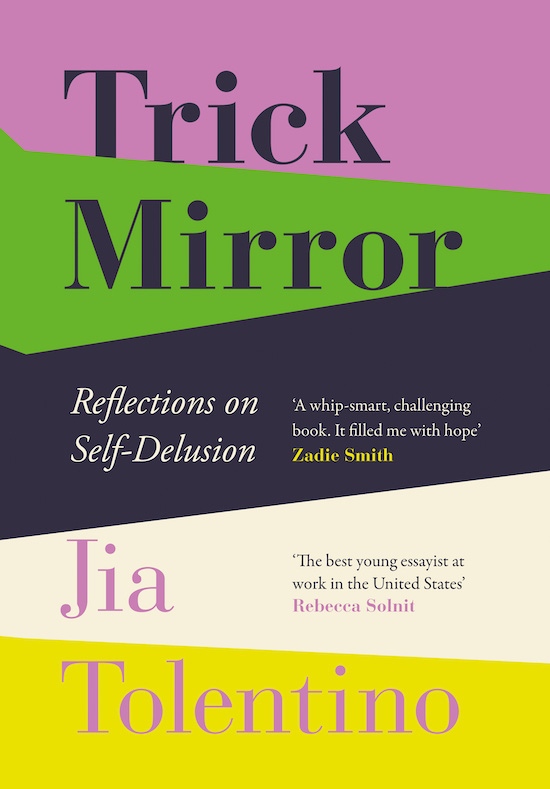Subtitled ‘Reflections on Self-Delusion’, Jia Tolentino’s terrific selection of essays gleans much-needed sense out of the daily distortions and conflicted opinion that emanate from our mass media outlets. This assault, as Tolentino neatly has it, is “blitzing our frayed neurons in huge waves of information that pummel us”. Often the sparring dialectic in evidence here pairs Tolentino’s current self in a duel with her youthful (mis)understandings; experience leads to a rigorously bracing self-interrogation.
The first essay is on the internet and its effects on our identity, how it inflates our opinions and our sense of self-importance. Her thoughts touch on virtue signalling, Gamergate, the #MeToo movement, and trolling. She argues persuasively that we should “care less about our identities” online and become “deeply skeptical of our own unbearable opinions”. Favourite that.
Tolentino then writes amusingly about the ideal woman “always optimising”. We learn pleasingly that she is “extremely suspicious of our old friend barre”. To enlighten the unfit: barre is a fitness technique invented in the sixties by Lotte Berk, a ballerina. The exercises are based on Berk’s dance training; the poses look a tad lewd and are named as such – the Peeing Dog, The French Lavatory, Fucking a Bidet. Joan Collins and Edna O’Brien are said to be devotees. The essay is astringent too on ‘athleisure’ something Tolentino defines as “exercise gear that you pay too much money for”. Aghast we hear that such kit was a $97 billion earner by 2016. The absurdities of some Lululemon styles are highlighted.
She concludes that women are now less than oppositional to technological advances in beauty management and that “we have deployed technology not only to meet the demands of the system but to actually expand these demands.” Perhaps, she argues, the system needs some undermining disloyalty…
Tolentino had, what sounds to me, a pretty demanding religious upbringing centring on an enormous evangelical church near Houston she calls “the Repentagon”. Christianity gave her “a leftist worldview, an obsession with everyday morality, an understanding of having been born in a compromised situation, and a need to continually investigate my own ideas about what it means to be good.” Ever the contrarian she becomes a fan of DJ Screw and his woozy sounds. We learn Screw became addicted to the opiates in cough syrup and that this gave his music “a tug of unease, a blanket of reassurance” that Tolentino hints felt connected to the sultry vibe of the Texan city.
Her faith falters; doubt creeps in. Why? She hears stories of sexual abuse by clerics, subsequent cover-ups, and other starkly hypocritical inconsistencies that see the rapacity of parishioners undermining the economic redistribution preached by the Gospels: the usual suspects. She stops believing in God “the year I first did ecstasy.”
The researcher Ann Shulgin’s blithe description of the drug’s effect is quoted: “penicillin for the soul”. But Tolentino thinks MDMA a two-edged sword and extrapolates: “I might only be hoping to remember that my ecstatic disposition is the source of good in me – spontaneity, devotion, sweetness – and the worst things, heedlessness, blankness, equivocation, too”.

That public dishonesty is near ubiquitous in this age is the subject of another fine essay where she notes a cultural shift in the character of America “making scamming – the abuse of trust for profit – seem simply like the way things were going to be”. Pessimistically she notes that “con is in the DNA of this country”. Her vitriol scalds Facebook and Amazon; rip-off schemes for student debt are excoriated. Tolentino’s rant chimes with the Roxy Music line from ‘Street Life’: the good life isn’t won by degrees, no.
And then there are all those crappy rip-off palliatives for women: “market-friendly feminism”. She notes “we got … a bottomless cornucopia of privatized nonsolutions: face serums, infrared saunas, wellness gurus like Gwyneth Paltrow”. But Tolentino is super self-aware too, worrying about the line between being a “woman who takes feminism seriously” and a “woman selling her feminist personal brand”.
All of which leads us, inevitably, to Trump, the most successful con artist of our age. Tolentino writes depressingly: “I have felt so many times that the choice of this era is to be destroyed or to morally compromise ourselves in order to be functional – to be wrecked, or to be functional for reasons that contribute to the wreck.” Joseph Roth couldn’t have put it any better.
Exile (like Roth) is always an option, yes, but the pain of that is very real and this is why so many end up compromised. But you can still be… difficult. The cult of the difficult woman is another of Tolentino’s fascinations. She reminds us correctly that “any woman whose name has survived history has done so against a backdrop of male power.” Her discussion has a characteristically broad church and stars Delilah, Joan of Arc, Sylvia Plath, Lindsay Lohan, Mary Wollstonecraft, Kim Kardashian, and Sarah Huckabee Sanders, amongst others, in a bravura display of knowing. Her line of fire targets “bullshit celebratory hagiography” and aims at calling out con artists no matter what their chromosomal make-up may be.
To paraphrase Tolentino writing about Jeffrey Eugenides I own up to an unavoidable male consciousness threaded through this review. Her book took me some time to finish as I near continually shared points out loud with a woman I know very well because, ahem, we are married. Tolentino is quite the sceptic on that institution in the last essay here, ‘I Thee Dread’. This is understandable because she has been invited to over forty-six of the things and that’s way too many for anyone.
Tolentino’s mental cleansing acts like a literary disinfectant; the verbal equivalent of a water cannon fired at the fetid walls of the foul stable that is Trump’s America. Short of wiring the entire body politic to ECG machines it is hard to imagine, after reading Tolentino’s diagnoses, a more accurate and prescient way of taking her nation’s pulse.
Trick Mirror by Jia Tolentino is published by HarperCollins



